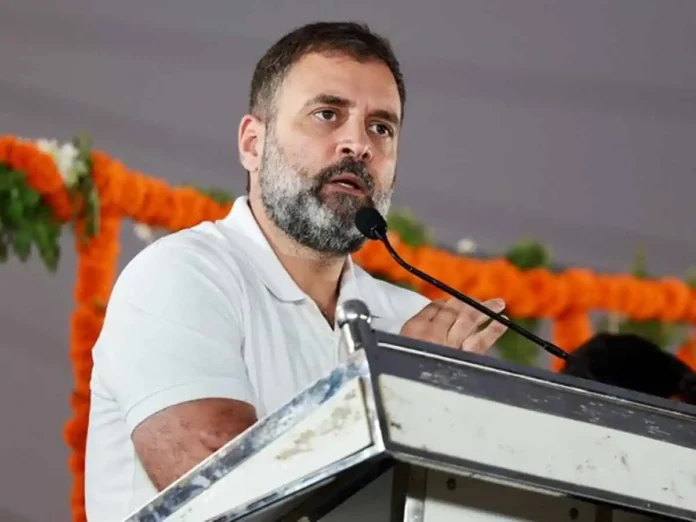In a recent viral video, Congress leader Rahul Gandhi candidly discussed a topic that has long piqued public curiosity: his marital status. The video, which has quickly garnered over 4 million views, features Gandhi engaging in a light-hearted conversation with young students during his visit to Srinagar. The question of why Gandhi, now in his early fifties, remains unmarried has resurfaced yet again, prompting an honest and reflective response from the leader.
During the interaction, a group of women students asked Gandhi about his decision to remain single. Gandhi responded with a mix of humor and introspection, shedding light on the pressures and expectations that come with such a personal choice. “For 30 years, I’ve navigated the intense pressure to get married,” Gandhi shared. “It’s been a journey of understanding what truly matters to me amidst external expectations.”
Gandhi’s response reflects a broader issue faced by many in demanding professions: the balancing act between personal life and public responsibilities. In his case, the intense scrutiny and high expectations placed on public figures often amplify these pressures. He discussed how societal norms and personal expectations can weigh heavily on individuals, particularly those in the public eye.
The leader’s openness about his personal life highlights a significant aspect of modern life for those in high-pressure roles. Many individuals in demanding jobs, whether in politics, business, or other fields, face similar challenges in managing personal and professional expectations. Gandhi’s experience underscores the importance of having a robust support system to navigate these pressures effectively.
Support systems, Gandhi noted, are crucial for maintaining mental and emotional well-being. For individuals in high-stress roles, having a reliable network of family, friends, or even professional counselors can make a significant difference. Gandhi emphasized the value of such support, both in managing public scrutiny and in making personal decisions that align with one’s values and aspirations.
The discussion also touches on broader societal issues regarding the expectations placed on individuals, particularly those in high-profile positions. Gandhi’s experience serves as a reminder that everyone, regardless of their public status, must grapple with personal choices and societal pressures. His willingness to speak openly about his choices offers a refreshing perspective on the often-unspoken challenges faced by those in the limelight.
Moreover, Gandhi’s approach to addressing the topic with honesty and humor provides an example of how public figures can navigate personal questions while maintaining their integrity. It reflects a growing trend towards transparency and authenticity in public discourse, where personal experiences and struggles are acknowledged as part of the broader human experience.
In essence, Gandhi’s remarks provide valuable insight into the balancing act between personal life and public duties. They underscore the importance of having a strong support network and the need for societal empathy towards the personal choices of individuals, especially those in the public eye. His openness invites a more nuanced understanding of the pressures faced by public figures and highlights the importance of addressing these challenges with support and compassion.
As the conversation continues, it becomes clear that Gandhi’s story resonates with many who face similar pressures in their own lives. His experience serves as a reminder that personal choices, whether related to marriage or other aspects of life, are deeply personal and should be approached with understanding and support.
In expanding on Gandhi’s reflections, it’s essential to recognize the broader implications for those navigating high-pressure environments. The scrutiny and expectations faced by public figures like Gandhi offer a window into the unique pressures that come with high-profile careers. These pressures often extend beyond the individual, impacting their families and support systems as well.
Public figures, especially those engaged in politics or high-stakes business roles, often encounter intense media scrutiny and public expectation. This scrutiny can exacerbate personal challenges and amplify the stress associated with maintaining a public persona. Gandhi’s experience underscores how this external pressure can intersect with personal choices, making it crucial for individuals in such positions to have robust support mechanisms in place.
Gandhi’s openness also brings to light the need for societal shifts in how we view personal choices and public expectations. As public figures share their personal struggles and decisions, it prompts a broader discussion about empathy and understanding. The conversation invites a re-examination of how societal norms and expectations impact individuals, particularly those who live under the public eye. It suggests that the pressures of public life can sometimes overshadow the personal dimensions of individuals’ experiences, necessitating a more compassionate approach.
In practical terms, those in high-stress roles can benefit significantly from establishing and maintaining support systems. These systems might include family, friends, mentors, or mental health professionals who can provide guidance and support. For instance, having open channels of communication with trusted individuals can help manage the stress and expectations that come with demanding roles.
Additionally, the importance of mental health resources cannot be overstated. Access to professional counseling and therapy can offer individuals strategies to cope with pressure and maintain well-being. As the conversation around mental health gains traction, it’s crucial for workplaces and public roles to integrate supportive practices that recognize the unique challenges faced by individuals in these positions.
Gandhi’s discussion also touches on the evolving nature of public discourse. As societal attitudes shift towards greater transparency and understanding, there is an increasing recognition of the complex interplay between personal and professional life. This evolving dialogue encourages a more nuanced view of personal choices and highlights the importance of support systems in navigating both public expectations and personal challenges.

